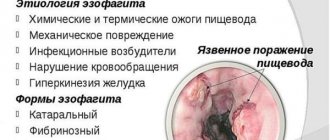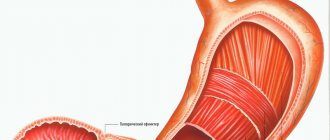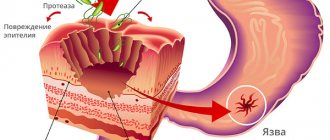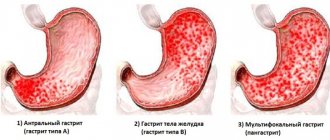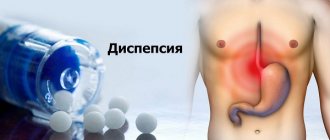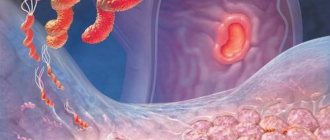Some dysfunctions of the stomach may depend on changes in the innervation of the stomach or on actual diseases of the gastric nerves. In particular, they tried to connect disorders of the secretion of gastric juice (increased acidity, supersecretion) with the abnormal state of the secretory nerves.
Many cases of “cardialgia” were considered as pure neuralgia of the sensory nerves of the stomach, and in the field of motor functions of the stomach, nervous states of weakness (nervous atony of the stomach) and nervous states of muscle irritation (the so-called peristaltic restlessness of the stomach, constant transfusion in the stomach, etc.) were also distinguished. .
There is no doubt that in severe organic diseases of the nervous system, severe gastric symptoms may occur as a direct result of nervous irritations. Just as an example, we should recall “nervous” vomiting in case of brain tumors and meningitis, “gastric crises” in drug addicts, etc.
Therefore, it is quite possible that real primary diseases of the sensory, motor and secretory nerves of the stomach can cause corresponding disorders. For example, the above-mentioned attacks of nervous vomiting with simultaneous profuse secretion of gastric juice, as well as pain in the stomach, most likely depend on nervous causes.
In the same way, gastric phenomena occurring in diseases of other organs, especially the internal secretion organs (thyroid gland, ovaries and ovaries), can most likely be explained by direct toxic or reflex irritations of the nerves of the stomach.
In all these cases, however, the matter is not in gross anatomical, but rather in functional disorders of the nerves of the stomach; this painful dysfunction manifests itself at different times, with varying strength, and depends partly on abnormal stimuli, partly on pathological functional irritability.
True, until now it is hardly possible to establish exactly the extent to which functional disorders of muscles and glands manifest themselves independently - without the influence of nerves.
The predominant number of extremely frequent cases, now usually designated as nervous dyspepsia, have, however, in our opinion, a completely different origin. Such patients indicate that after each meal they have a feeling of heaviness and pain in the stomach, and that after just a few bites they feel fullness and bloating in the stomach.
As a result, there is often a strong feeling of tightness in the chest and palpitations. Often patients also suffer from belching, sometimes leading to vomiting. Although all these phenomena can appear to the same extent in real diseases of the stomach, still usually other accompanying symptoms indicate the “nervous” nature of the suffering.
First of all, it is easy to establish that the above-mentioned disorders are extremely variable in their strength. The same patients who today complain of a painful feeling of heaviness in the stomach after a few spoons of soup can endure an entire formal meal another time in a good mood, without even once thinking about their stomach.
But as soon as they are irritated, excited, in short, in an “irritable mood,” gastric disorders immediately occur to an increased degree. In all such circumstances, the influence of ideas and the general mental state on the state of the stomach is most clearly manifested.
Everyone knows to what extent strong irritation, experienced fear or hope, sad or joyful excitement can immediately deprive us of appetite, how strong excitement often causes vomiting, etc. In excitable people, even the mildest mental affects cause a similar picture.
But nothing acts in this regard as unfavorably as that mental arousal (hypochondriacal state of fear), which determines this or that physical well-being. The fear that the food eaten may be harmful, the constant worry that there are the beginnings of a serious stomach disease - these are the states of excitement that primarily support the disease and gradually increase it.
Thus, that peculiar mental hyperesthesia arises, which gives significant pain in the stomach, when, in fact, there are completely normal everyday sensations. In the same way certain movements arise, partly unconsciously, partly voluntarily; they cause belching, vomiting, etc.
Gastric disorders, perceived only by the patients themselves as truly existing, as well as real, objectively observed disorders (belching, vomiting), are partly a consequence of pure self-hypnosis, and partly can occur as a result of it.
The so-called “expectations of some phenomenon” also play a significant role in the occurrence of various nervous gastric symptoms, just as in the case of numerous other “nervous” phenomena. Painful anticipation of a symptom causes in nervously predisposed individuals a seemingly real sensation of the symptom.
From fear of pain, imaginary pain arises; from fear of nausea, real nausea arises, which can reach the level of vomiting. In practice, carcinomaphobia of fearful patients is undoubtedly of particular importance. Nowadays, when there is so much talk about cancer, the fear of getting cancer, and especially stomach cancer, is very common among laymen. Often it is explained mainly by the fact that cases of cancer have already been observed among the patient’s relatives or friends. Then carcinomaphobia produces significant neuro-dyspeptic disorders.
What we especially want to emphasize by this is our conviction that the vast majority of cases of so-called nervous dyspepsia are not any disorder of the function of the nerves of the stomach as such, but depend on painful central psychogenic excitations, the consequences of which manifest themselves mainly in the area of functions stomach.
Nervous dyspepsia is only a single example from that large group of nervous diseases that owe their origin to hypochondriacal conditions and can appear in a wide variety of organs; it represents, strictly speaking, only a partial phenomenon of general nervousness or neurasthenia and is therefore designated by some doctors rightfully as “neurasthenia gastrica.”
Accurate clinical observation can easily prove that almost all the usual “stomach symptoms” under certain circumstances can arise purely psychogenic. It is well known that lack of appetite is often the result of ordinary mental or sometimes hypochondriacal bad mood.
But the so-called ravenous hunger (bulimia) in most cases probably has purely mental causes, arising from special obsessive ideas. There is no doubt that various abnormal sensations in the stomach, from a simple feeling of heaviness to the most severe pain, can arise purely subjectively.
The best proof of this is the almost magical influence of purely psychological, suggestively acting means (simple sedation, hypnosis, external and internal means, etc.). It is very important to know that in numerous cases belching and vomiting are also of purely mental-central origin.
Under the influence of certain ideas, belching or vomiting appears, then, as has been said, they are expected as something inevitably necessary, appearing first as a result of unconsciously voluntary movements and finally, to a certain extent, as a painful habit.
Many neurohypochondriacal patients, who consider themselves obsessed with a stomach disease, become absolute virtuosos in the ability to induce belching or vomiting, and as a result of exercise, this reflex process can gradually be caused more and more easily in an unconsciously voluntary form.
In addition, general mental states of excitement often cause belching or vomiting due to direct irritation. We know people in whom the urge to vomit or vomit appears with every stronger excitement. Already in children there are far from rare conditions of persistent vomiting after almost every meal; these conditions should be considered as purely nervous, due to the rapid and beneficial effect of exclusively mental treatment (above all, the strict prohibition of vomiting!).
We observed exactly the same thing in young girls, often in connection with other hysterical symptoms. It should also be briefly mentioned here that “nervous”, that is, hysterical, bloody vomiting can also occur. More detail on this can be found in the chapter on hysteria, and in general it is necessary to review the chapters on hysteria and neurasthenia in addition to what has been said here.
Very often, along with gastric symptoms, other nervous phenomena are observed: signs of increased nervous irritability, head symptoms (headaches, a feeling of heaviness in the head, dizziness), abnormal sensations in the extremities (pain, feeling of cold, numbness). Almost always there are known intestinal symptoms at the same time. Patients complain about their bloated abdomen and especially about irregular and difficult bowel movements. Nervous dyspepsia in many cases is only part of the general nervous constitution.
Nervous dyspepsia acquires serious significance when patients begin to take little food, either due to fear of dietary mistakes or due to lack of appetite caused by internal anxiety.
In these cases, sometimes complete anorexia nervosa occurs, persistent fear before every meal, almost complete refusal of all food and significant, sometimes even very significant exhaustion; It goes without saying that the result, of course, is great general physical weakness and loss of strength. Such patients end up bedridden and at first glance really give the impression of being seriously ill.
Causes of the disease
Stomach neurosis is a fairly common disease. About 87% of people have suffered from it at least once in their lives. It is often confused with other diseases of the gastrointestinal tract, such as gastritis or stomach ulcers.
Causes of neurosis:
- Hard work with nervous tension and stress.
- Systematic, regular lack of sleep.
- Mental disorders.
- Fast and fast paced life.
- Mental overstrain.
- Poor nutrition.
- Consumption of low-quality products.
- Viral diseases.
- Some diseases of the gastrointestinal tract and other organs.
Unfortunately, in the modern world people forget about peace and measured life, trying to be on time everywhere. Many people eat processed foods or food from cafes, often snacking on stale and low-quality products on the go. This usually results in health problems, including the gastrointestinal tract.
How to set
If a massage therapist has the skills, a person nearby can correct the hernia. The patient should lie on the surface with his arms extended along the body, after which the abdomen should be carefully palpated in search of the displaced organ. Fold your hands lubricated with cream into a butterfly, fingers should be bent. To repair the tear, you need to gently move the hernia from the stomach downwards with both hands on the left and right sides using pulling movements with your right hand.
The presence of air indicates an air hernia, which can cause serious problems. It must be brought out in a spiral towards the center towards the navel. If there is no pain, the abdomen must be grabbed with the patient’s right hand and pulled up; areas that do not yield should be skipped and pulled further. At the next stage, it is recommended to perform the same manipulations with stroking movements; it is recommended to do the entire procedure in several steps.
Important: When repairing a hernia, it is not recommended to rush, as this can cause unpleasant consequences.
Symptoms of the disease
Most often, gastric neurosis appears in women who have reached the age of 35 years. Doctors divide signs of the disease into two types:
- Intestinal neuroses.
- Painful attacks in the abdomen.
The presence of the disease can be determined by the following symptoms:
- Constant feeling of hunger.
- Food and its smell are disgusting.
- Heartburn.
- Nervous colic.
- Nausea and vomiting.
- Increased gas formation.
- Problems with excretion of feces.
- Severe headaches and migraines.
- Pressure surges.
- Dizziness.
- Feeling of chest tightness.
- Heart pain and rapid pulse.
The most common symptom is vomiting caused by nervousness (aerophagia). This happens because when a person swallows food, he also swallows air. After which the latter begins to circulate between the cardiac section in the stomach and the pharynx, and then comes out with a loud sound and a strong unpleasant odor, which provokes vomiting.
It is difficult not to notice the manifestations when gastric neurosis occurs. The symptoms of the disease are so pronounced that they sometimes cause a lot of inconvenience. People constantly experience discomfort.
Important: doctors recommend seeking help at the first suspicion of gastric neurosis. Its symptoms are easy to recognize, as they are very pronounced.
First aid before the doctor arrives
Many people do not know what to do and what to do if their abdomen is torn. It must be taken into account that traditional methods of therapy aimed at the spine, the use of heat and ointments do not give the desired effect.
- If a patient has severe pain in the abdominal area after lifting weights and there is a suspicion of a tear, the first thing to do is fix it.
- The patient must be laid on a hard, flat surface, a folded sheet made of hard fabric should be placed under the body in the lumbar area, resulting in a strip of 20-30 cm.
- The first turn must be made near the groin, the second - along the navel, the third - under the diaphragm (if there is enough length). The bandage should be fairly tight, but strong pressure should be avoided.
Important.
When handling women, special care should be taken, as similar sensations also occur with diseases of the genital organs. When getting up, the patient must also be careful; this should be done gradually from the side, and not from the back.
https://youtu.be/gtVzJV3Sqcc
Forms of gastric neuroses
Doctors will identify several forms of neurosis:
- The most common pathology is constant heartburn. It occurs spontaneously when there is no reason for it. It is difficult to relieve with medications and special diets.
- The aerographic form of neurosis is manifested by involuntary swallowing of air while eating and drinking. This causes a person to belch, which leaves an unpleasant taste in the mouth, and this can cause nausea and vomiting.
- Aneroxic form of neurosis is manifested by aversion to food. With it, a person cannot eat and almost completely refuses food. This form can be fatal if left untreated.
In some cases, the patient may experience ravenous hunger, in which the person uncontrollably absorbs food in large quantities. To prevent weight gain, patients are forced to deliberately induce vomiting. This disease is treated by a psychotherapist.
Goals and methods of therapy
There are several important points in the treatment of such a pathology as gastric neurosis.
The first is the patient’s “fatherly” conviction that he has a neurosis with all its frightening consequences (with a gentle indication of the door to the psychoneurologist’s office), and not an irritated one: how many times can you repeat that you have nothing?!
And only after a course of “cause-detachment” therapy has been carried out under the guidance of a specialist, the second stage is possible - you can begin to treat actually existing changes in the organs.
Therefore, the main emphasis is on the use of psychotherapeutic (hypnotherapy and related) methods, enhanced by:
- taking tranquilizers recommended by a doctor;
- the use of physiotherapy and balneotherapy;
- stay at the resort;
- carefully thought out herbal medicine and vitamin therapy.
Strict adherence to the diet prescribed by the doctor, abandonment of the usual nicotine intoxication and random “swallowing of pills with or without reason” also help restore the balance of reactions occurring in the nervous system, which, once restored, will regulate everything else.
Diagnosis of the disease
Gastric neurosis, the symptoms and treatment of which are very similar to other diseases of the gastrointestinal tract, is difficult to diagnose independently. Therefore, it is necessary to consult a doctor. He will check for pancreatitis, gastritis, ulcers and stomach cancer.
Diagnosis is carried out by gastroenterological examinations. They help to identify the root cause that provoked gastric neurosis. If the doctor does not find any disturbances in the gastrointestinal tract, then a neurologist will treat the disease.
Stomach neurosis, the symptoms and treatment of which we discuss in our article, often occurs due to nervous disorders and stress, as a result of which its therapy is not carried out by a gastroenterologist.
Treatment of the disease
When diagnosed with gastric neurosis, treatment usually consists of vitamins, medications and the help of a psychologist. This allows you to approach the disease from all sides.
During therapy, the patient is prescribed a special diet, which is selected individually. It depends on the manifestations of the disease and the patient’s condition. The doctor also prescribes sedatives, which enhance the effect of working with a psychologist.
It is important to remember that treating this disease yourself is very dangerous. If you use medications not prescribed by a doctor, this will provoke the appearance of other diseases and cause serious consequences.
To treat this disease, drugs are prescribed that have a positive effect on the endocrine system, normalizing its functioning.
Physiotherapeutic procedures improve the functioning of the gastrointestinal tract and normalize the patient’s mental state. Additional treatment measures include massage, water therapy with soothing herbs and sea salt.
Also, for a speedy recovery, it is recommended to spend more time in the fresh air, walk, play sports and eat right. By consuming vitamins B and C, you will help relax your nervous system. It would also be a good idea to relax in sanatoriums, away from noisy cities.
This therapy will help you quickly overcome the disease and improve your health. It should be noted that neurosis of the stomach and intestines is treated according to the same principle.
Preventive actions
To protect yourself from such a disease, it is very important to follow prevention. It includes creating conditions for a painless existence. Try not to take all life's troubles to heart, avoid negative emotions and personal conflicts both at work and at home. Perform a simple set of physical exercises daily and lead an active lifestyle. If your whole life is scheduled minute by minute, then all sorts of incomprehensible thoughts will not enter your head.
In the issue of prevention, drugs play an important role. But they must be prescribed by a doctor. It is best to purchase herbal medicines. An excellent option would be valerian, motherwort, mint and rosemary. In some cases, the doctor prescribes taking luminal in small dosages.
Stomach neurosis is a disease that brings with it a lot of unpleasant sensations. It can be provoked by various stressful conflict situations. Therefore, try to fill your life only with positive moments, enjoy every new day, pay more attention to your loved ones rather than work, walk in the fresh air and you will never hear about such an illness.
After diagnosis, the doctor prescribes treatment. There are three options to solve the problem.
- Drug treatment of neuroses with classical chemical drugs, which are prescribed by a doctor after identifying the symptoms and treatment.
- Treatment with folk remedies based on herbs and infusions (you should not take risks and be treated without first consulting with your doctor, as complications may arise).
- Communication with a psychotherapist to improve the general psychological state of the body and prevent new possible diseases.
- In the final stages, gastrointestinal neurosis can greatly undermine a person’s health, so it is absolutely impossible to delay treatment. Due to the developing disease, a number of other, more serious pathologies may arise, which will be much more difficult to diagnose and treat.
To avoid repeated neurosis, you should rest more and take time for yourself. For a month after treatment, do not consume large quantities of fatty, fried meat (you can eat boiled domestic chicken), fish (you can only boil it), fried eggs, chocolate is also contraindicated, you should not drink a lot of coffee, and also eat white cabbage and pasta.
It is advisable to spend more time in the fresh air and take soothing baths.
Visit your doctor 3 weeks after treatment.
With intestinal neurosis, treatment of which was started promptly and correctly, in most cases a positive outcome of therapy is predicted. But there is no guarantee that the disease will not recur. To prevent gastric neurosis, the patient is recommended:
- avoid stressful situations;
- Healthy food;
- normalize physical activity;
- give up bad habits forever;
- reduce the intensity of physical activity;
- devote enough time to sleep and rest;
- treat all diseases in a timely manner.
Many patients manage to get rid of the problem on their own, without the use of medications. To do this, you need to get rid of stress, normalize sleep and ensure proper rest for the nervous system. This can be done well with the help of sanatorium-resort treatment.
If it is not possible to take a vacation and relax, the following measures are recommended to relieve stress:
- daily walks before bed;
- cold and hot shower;
- balanced diet;
- no processing.
It is important to normalize your work schedule so as to avoid overtime and night shifts during treatment. To get rid of stress, you need healthy sleep of at least eight hours. Since patients with neurosis often report problems with sleep, walking in the evenings and taking natural soothing decoctions based on medicinal herbs (chamomile, mint, lemon balm) before bed are recommended.
If the disease is accompanied by symptoms of autonomic dysfunction, a good effect is achieved by regularly taking a contrast shower.
With neuroses of the intestines and stomach, patients often refuse food due to nausea and lack of appetite. At this time, it is necessary to eat right - give preference to light and healthy foods, eat little but often. It is recommended to eat small meals every three hours. The menu should give preference to fermented milk products and cereals.
The only preventive measure for such disorders is the absence of stress. To do this, you need to normalize your daily routine, get rid of insomnia and not get nervous over trifles.
Nutrition during neurosis
Proper nutrition and a special diet play a big role in the treatment of the disease. It helps a person avoid nausea, vomiting and other unpleasant symptoms until complete recovery. The basic rules are:
- Chewing food thoroughly.
- Swallowing should be done in small portions.
- Eat often (5-6 times a day), but in small portions.
- Do not eat fatty, fried or smoked foods.
- Avoid spicy and salty foods.
- Cooking dishes should be steamed, baked or boiled.
These are the basic rules of the diet; your doctor will tell you more about it.
Folk remedies
If neurosis of the stomach and intestines develops, the symptoms can be relieved with the help of traditional medicine:
- For treatment, you can drink soothing herbal teas made from oregano. They not only have a calming effect, but also an analgesic effect.
- Oregano is also good to combine with valerian, hawthorn and motherwort. This collection quickly calms you down and gives you a good, sound sleep.
- Melissa helps relieve nausea and vomiting, and will also help calm the nervous system.
- Decoctions and tinctures of St. John's wort have anti-inflammatory and antimicrobial effects. This helps calm the stomach and intestinal tract.
- Bedstraw roots and grass are used as an antibacterial, analgesic and sedative.
These simple recipes will help you overcome the disease, but such treatment can only be carried out after consulting a doctor.
Rehabilitation period
After treatment it is necessary to undergo a rehabilitation course. During it, you should follow the recommendations of a specialist, eat right and avoid physical activity. Avoid stress, nervous tension and fully devote your time to your favorite activities. Try to get rid of bad habits. All these simple techniques will help prevent hysterical stomach neurosis in the future.
Stomach neuroses in any form cause a person a lot of inconvenience. Because of them, appetite is disrupted, pain in the stomach, heartburn and other discomfort appear. Proper and timely treatment will help you defeat the disease and prevent its recurrence.
